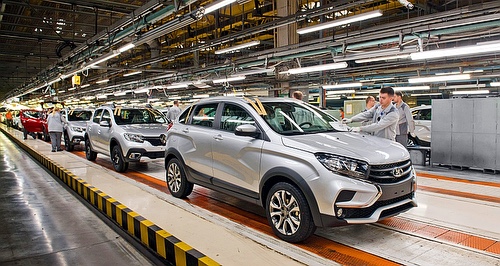Make / Model Search
News - General News - World CrisisCar brands put brakes on RussiaHalt: Several car-makers have halted exports to Russia but supply of parts and raw materials into European factories has forced some production lines to idle. Russia boycott by car-makers begins, raw material shortages cause supply concerns8 Mar 2022 By MIKE FOURIE THE ongoing invasion of Ukraine has – predictably – prompted several car manufacturers to cease imports to, and production in, Russia.
However, resultant supply-chain disruptions have caused production delays at several carmakers’ European factories. That, allied with the ongoing semiconductor shortage, is bound to affect car deliveries around the globe.
Aston Martin, Ford, Honda, General Motors, Jaguar Land Rover, Volkswagen Group (including upmarket brands Bentley and Porsche), Volvo and Toyota have suspended vehicle exports to Russia, because the sanctions that have been imposed on the country are hampering efforts to supply to cars to that market – and conclude transactions, once stock has been delivered.
In the meantime, several manufacturers, including BMW, Ford, Hyundai, Mercedes-Benz, Toyota and, most notably Volkswagen, have suspended production activities in Russia.
“Against the background of the Russian attack on Ukraine, the Group Board of Management has decided to stop the production of vehicles in Russia until further notice. This applies to the production sites in Kaluga and Nizhny Novgorod,” Volkswagen AG said, adding that it would give employees “short-time working benefits” while production was stopped.
Renault, which has a majority stake in AvtoVAZ, which produces vehicles for market-leading Lada and is reported to rely on its Russian division for about 12 per cent of its total revenue, saw its share price plummet to its lowest level since November 2020 last week.
AvtoVAZ only briefly paused production at its Togliatti plant “due to a semiconductor shortage” but Toyota halted production at its St Petersburg factory and stopped importing vehicles to the country indefinitely.
Mazda will soon end exports of parts to its joint-venture plant in Vladivostok, Mitsubishi warned it may suspend vehicle assembly and Hyundai said it had not yet decided when to resume operations at its plant (also located in St Petersburg).
“Toyota is watching the ongoing developments with great concern for the safety of people of Ukraine and hopes for a safe return to peace as soon as possible," the firm said.
"Hyundai Motor Company is deeply concerned by the situation in Ukraine. Hyundai Motor Manufacturing Russia’s operations are suspended until further notice due to ongoing global logistics issues with components delivery," Reuters quoted the Korean car giant as saying.
As GoAuto reported last week, Ukraine is critical to the supply of wiring harnesses to car makers (through firms such as Leoni, Fujikura, Nexans and Yazaki), and the disruption in supply has forced several brands to suspend production at their European factories, which is likely to compound delays in deliveries of some premium models to markets such as ours.
With BEV production at the VW Group’s Zwickau factory already suspended until March 18, a Volkswagen spokesperson told Automobilwoche that the firm’s Wolfsburg plant, which produces Golfs, Tiguans and Tourans, would idle for at least two weeks from March 14.
Automotive News Europe reported that Audi had paused production lines building the A4 and A5 in Ingolstadt, while output of A6s and A7s in Neckarsulm had also been suspended.
Porsche temporarily stopped production of its Macan and Panamera models in Leipzig, while BMW on Monday halted production at its home plant of Munich (3- and 4 Series) and at it biggest European factory, Dingolfing (4-,5-, 6-, 7- and 8 Series), initially for a week.
A BMW spokesperson said it was not clear when output would resume. "We have no visibility and are in intensive discussions with our suppliers," a spokesperson told Automobilwoche.
Production of Minis at BMW's factory in Oxford, England, was also halted temporarily.
Mercedes-Benz, in turn, announced that it was reducing production at some of its European plants (such as Sindelfingen, Germany), but hoped to avoid total production stoppages.
To make matters worse, German car manufacturers association VDA told Automotive News Europe this week that over and above the disruptions to shipping, rail and air freight (which compounded problems in the supply chain at a time when inventory levels were already low), the industry body also anticipated shortages in a range of raw materials soon.
"It is difficult to provide a reliable outlook… but one thing is clear – there will be further disruption of vehicle production in Germany," VDA said in a statement. "In the long term, the car industry is facing shortages and higher prices of raw materials."
The association highlighted neon gas (critical for semiconductor production), of which Ukraine is a key exporter, while Germany relies on Russia for about a fifth of its palladium (used in catalytic converters) as well as nickel (used in lithium-ion batteries) imports.
Lastly, the impact of sanctions on Russia’s economy and, therefore, its automotive market, are bound to be long-lasting and far-ranging.
However, the West’s punitive measures are also likely to benefit Chinese car brands, which sold more than 100,000 new vehicles in Russia last year. Recently, Chery and Haval made the top-10 selling car brands list in that country for the first time, which sets them up for further growth when the Ukraine crisis is over.  Read more |
Click to shareGeneral News articlesResearch General News Motor industry news |












Facebook Twitter Instagram